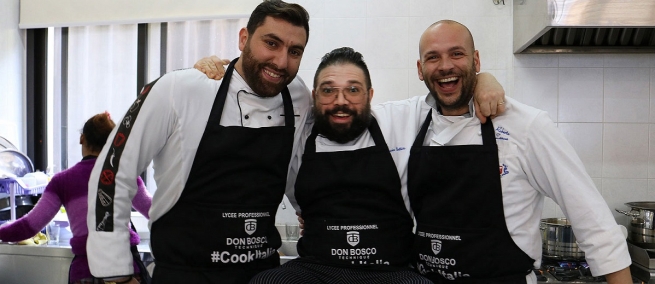LEBANON: Don Bosco Technique offers 90 students training in catering and hotel employment

(MissionNewswire) The Don Bosco Technique, located in Fidar, Lebanon, is one of the area’s few professional institutes and welcomes a large number of youth who have difficulties attending school. The goal is to provide them education and social supports so they remain in school and gain the skills needed for employment.
The Don Bosco institute offers several different programs for youth including mechanics, electrical installations, hairdressing, computer science and much more. One of the institute’s most praised and sought-after programs is focused on training catering and hotel staff students. There is a large employment sector across the world for graduates who want this kind of employment.
In order to implement the restaurant and catering program effectively, Salesian missionaries in Fidar asked for help from highly-qualified Italian chefs. The chefs’ primary objective is to refine the skills of the institute’s teachers in the field of Italian cuisine and gastronomy—much in demand in Lebanese restaurants.
The Italian chefs are also holding seminars and workshops for the preparation of bakery products, pastries and fresh pasta. These bakery courses provide specialized training for students. The ultimate goal is to equip students with highly employable skills in the workplace.
Ninety youth, sponsored by the Salesian Missions Office in Turin, Italy, will be attending the courses. Supporting future Lebanese chefs is one of many ways Don Bosco institutes are helping youth become productive members of their communities.
“Technical education, such as the catering and hotel program, helps ensure youth have an opportunity to gain an education and graduate with employable skills,” says Father Mark Hyde, director of Salesian Missions, the U.S. development arm of the Salesians of Don Bosco. “Because Salesian missionaries live in the communities in which they work, they are knowledgeable of market conditions and what employment sectors are the most advantageous for employment. Training programs are created in these areas to help youth have a smooth school to work transition.”
More than 25 percent of Lebanese citizens live in poverty. Poverty drops to 16 percent in urban areas like the capital city of Beirut, but climbs to 36 percent in some rural areas, according to the World Bank. Children from poor families are less likely to be able to complete their education and have limited employment opportunities as they get older. Many end up stuck in low-wage, seasonal and high turnover positions. As many as 20 percent of Lebanese citizens live with unimproved sanitation facilities and 10 percent of poor households have no access to clean drinking water.
Lebanon is also dealing with more than one million refugees who have fled the Syrian civil war, according to UNHCR – the UN Refugee Agency. Salesian missionaries have been working in Lebanon since 1952 and currently have two centers. The one center in Fidar has Don Bosco Technique and a youth center. The Salesian community in El Houssoun has an oratory and a reception house that has been housing Catholic refugees since the start of the war in Syria.
Sources:
ANS Photo (usage permissions and guidelines must be requested from ANS)
ANS – Lebanon – Let’s help future chefs!
World Bank – Lebanon




